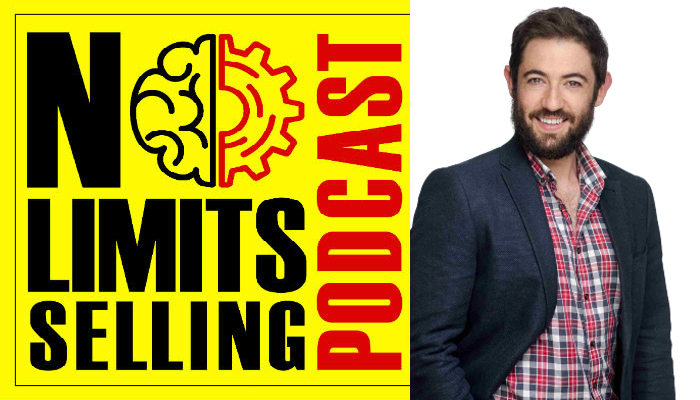Luke Charlton on How To Get High-Paying Clients
On Episode 213 of The No Limits Selling Podcast, we have Luke Charlton, Founder of LukeCharlton.com.
In 2013, Luke Charlton (AKA: The Aussie Hermit) decided to quit his comfortable 6-figure/yr government job, move halfway around the world, and start an online business as a Coach.
Thinking he knew enough about marketing to survive in one of the most expensive cities in the world (London), he quickly realized this online thing wasn’t as easy as it looked. Through years of trial and error struggling and nearly going bankrupt, Luke finally discovered the formula for online success now helping over 4,000 Coaches grow their businesses online.
Along with that, he's been featured in “6-Figure Coach” magazine, spent more than $16 million on advertising, banked $50M+ in sales for his clients, and has been hired by top ad agencies to write copy for experts such as... Bob Proctor, Mike Dillard, Neil Patel, Grace Lever, Ryan Moran, and many more.
Now he spends his days as a hermit living somewhere near Byron Bay, teaching other Coaches how to get a lot of clients by sending just one 15-minute email per day, which he’d love to share with your audience...
Luke’s Epic Resource List
Top link:
https://9emailoffers.com/
The 9 Email Offers that Get Clients Free:
(Includes bonus “1-Sentence Offer” gift. Just email Luke and ask)
https://LukesFreeGift.com
The 15 Minute Client Workshop:
(Reveals Luke's complete daily email client attraction system for free)
https://The15MinuteClientWorkshop.com
The Hermit Hole:
(A private community with more free trainings from Luke)
https://TheHermitHole.com

Contact Luke:
[EDITOR’S NOTE: This podcast is sponsored by No Limits Selling. It is a fun, fast-paced podcast that delivers hard-fought business advice that you can implement today to improve your sales and performance]
Interested In Our Real Estate Coaching Services? Explore Our Website: Link
Feeling Not Well Today? You Can Use Our Mindset Boosters App To amp Up Your Mood: Link
Find us on Social Media:
LinkedIn | Facebook community | Instagram
Like what do you listen to? Subscribe to our podcast!
Ready to become fearless? We can help you become fearless in 60 days so you accomplish more in your career Schedule A 15 min Call with Umar
Summary
Introduction and Background
The podcast begins with Umar Hameed, the host, introducing Luke Charlton, the founder of LukeCharlton.com. Luke shares his background and how he got started in the online marketing world at a young age. His first venture was selling an e-book on eBay, which sparked his interest in online marketing. He also delves into his early experiences with affiliate marketing, explaining how he learned the ropes and began to understand the potential of online sales.
Transition to High-Ticket Sales
Luke then discusses his transition from selling lower-priced products to high-ticket items. He explains that this shift was a strategic decision to increase revenue and cater to a different market segment. Luke shares his strategies for selling high-ticket items, which include understanding the client's needs, providing high value, and positioning the product or service as a solution to the client's problem.
The Importance of Mindset
The conversation then shifts to the topic of mindset. Luke emphasizes the importance of having the right mindset in sales and business. He talks about overcoming fear and rejection, two common obstacles in sales. According to Luke, developing a positive and resilient mindset is crucial for success in sales. He also highlights the role of persistence, explaining that consistent effort and determination can lead to significant results.
Conclusion
In the concluding part of the podcast, Luke shares his insights on the future of online marketing. He believes that personal branding will become increasingly important, as it allows businesses and individuals to differentiate themselves in a crowded market. Luke also discusses the potential of social media and content marketing in reaching a wider audience and building relationships with clients. He emphasizes the need for businesses to adapt to changing trends and leverage new platforms to stay ahead in the competitive online marketing landscape.
Questions & Answers
Who is Luke Charlton?
How did Luke Charlton start his career in online marketing?
What are Luke Charlton's strategies for selling high-ticket items?
What does Luke Charlton say about the importance of mindset in sales and business?
What are Luke Charlton's insights on the future of online marketing?
How does Luke Charlton view the role of personal branding in online marketing?
Don’t miss this opportunity to transform your real estate career with one-on-one coaching. As an experienced real estate coach, I, Umar Hameed, am dedicated to helping you unlock your full potential and achieve your real estate goals. To learn more about who am I and my clients ↓
If you’re ready to take the next step, book an appointment with me today and begin your journey toward success in the real estate industry.
